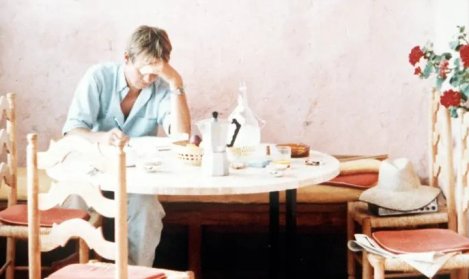
Bruce Chatwin Writing
This is the first in a series of posts on literary letters. I have just finished reading Under the Sun: The Letters of Bruce Chatwin, edited by Chatwin’s wife Elizabeth and his biographer Nicholas Shakespeare.
When I started reading Bruce’s work, he was a hero to me. One of the mixed blessings of biography is that you are likely to find out some uncomplimentary facts about your heroes. This is definitely the case with Bruce, who lived an oddly compartmentalized kind of life. He was married, yet carried on numerous affairs with men and women, some of which were predatory. Although I still love his writing, I would feel uncomfortable with the man himself. (For more on this subject, I would refer to two postings by his late friend, Patrick Leigh-Fermor entitled Bruce Chatwin: Letters from a Fallen Angel (or, A Woman Scorned and Bruce Chatwin’s Journey to Mount Athos.
Reading his letters, I find almost half of them deal with Chatwin’s search for a comfortable place to live, where he can read and write—separately from his semi-estranged wife Elizabeth—and carry on affairs. There was no love lost between him and the land of his birth, England. In a letter to Patrick Leigh-Fermor, he writes:
At least I thought that going to England in August might lessen the shock, climatically. But no! Nothing but rain. Freezing cold. I went wind-surfing on a scummy little reservoir near Oxford, and my hands were white and numb after ten minutes. But what I miss the most are the mountains! The country round here is tolerably attractive, immaculately kept: but then you keep running up against the cooling towers of the Didcot [nuclear] power-station; the antennae of Greenham Common; the nuclear installations at Harwell—all of which give me the feelings of claustrophobia.
But then there doesn’t seem to be anyplace that suits. It’s either too hot or too noisy or too crowded with tourists or yadda-yadda-yadda. To his in-laws, he complains:
But I’m afraid this gypsyish life cannot go on. I shall have, whether I like it or not, to get a proper bolt-hole to work in. Otherwise I find I can fritter away six months at a time without achieving anything, and that only makes me very bad-tempered. In a way, I like being in Italy, but the climate’s quite tough in winter, and the villages (because I’m sure it must be in a village) are usually quite depressing. Our old stamping ground in the Basses-Alpes is not half bad. Uzès is another possibility. What it’ll mean, I’m afraid, is that the London flat will have to go. I’m after 3 rooms: one to sleep and work in; one to live in, and a spare room. It’ll have to have a terrace, somewhere to sit out at least; and walks in neighborhood.
Alas, Bruce died without finding his perfect bolt-hole in a land with perfect climate. Every place has its disadvantages, even Los Angeles. Last night, I was jolted awake at 12:03 am by a Richter 3.7 earthquake whose epicenter was only a few miles south of me. And so it goes!
34.052234
-118.243685














You must be logged in to post a comment.